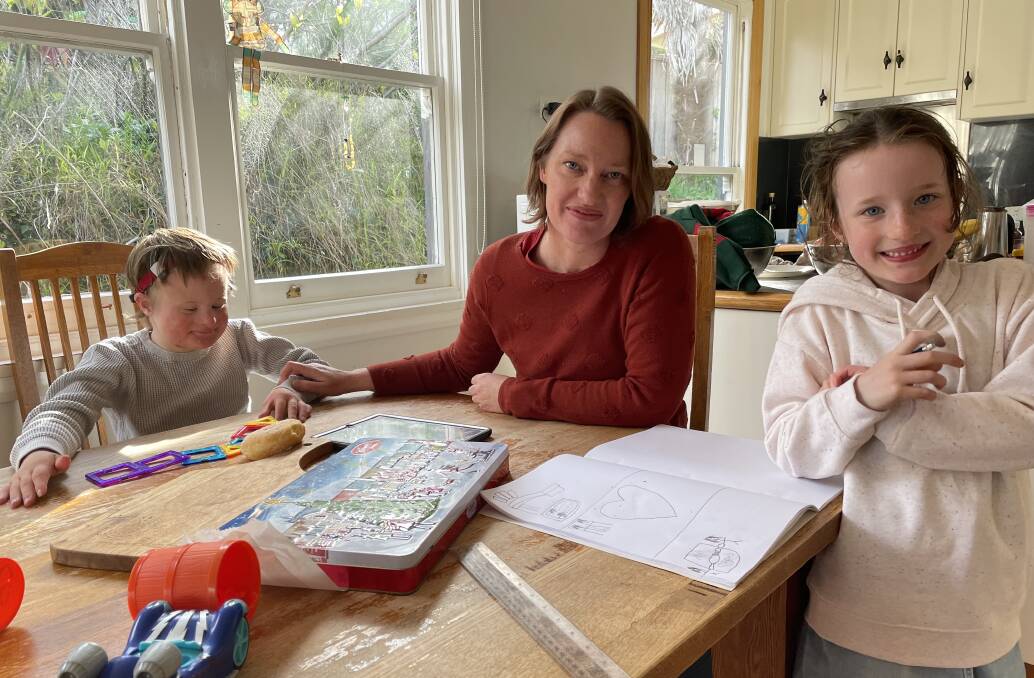
The predicted ramifications for vulnerable people stemming from border openings and COVID cases in Tasmania have been realised with potentially devastating effects.
Subscribe now for unlimited access.
or signup to continue reading
Rebecca Kelly and her 10-year-old son Ryan, who lives with Down syndrome and is medically complex, foreshadowed an impaired lifestyle following December 15, but what has happened since has made that impairment life-threatening.
The state government said they acknowledged "some people are anxious" about COVID, and pointed to supports implemented for vulnerable Tasmanians.
Dr Kelly, who is also the Down Syndrome Tasmania president, first shared her concerns with The Examiner in September.
"Once we've moved to open up, people with a disability will probably lose access to the community," Dr Kelly said at the time.
"For kids with disability, this will just be furthering the disadvantage they've already faced. It's just another place where they are being held back."
Speaking just weeks after the borders had opened, Dr Kelly described a world in which her family's lifestyle had gone from wary-but-happy, to virtually shut off.
"We've had to change our entire lifestyle. We no longer take any of the kids to the shops, with Ryan, and to a degree his little sister, we avoid all indoor spaces and anything where there's going to be a lot of people," she said.
His only outings are to outdoor spaces with very low risk of exposure. We try to avoid going to public places unless we need to. And soon we'll have to decide to what extent we catch up face-to-face with friends. We've lost our freedom and our sense of safety.
- Dr Rebecca Kelly
One of Ryan's medical conditions means his ear canals are prone to blocking and ear infections. Those infections, in Ryan's situation, are dangerous and have the potential to erode bone and enter his brain - something he had almost died from in the past.
Shortly after the borders opened, Ryan's ears got infected, but due to his infection being a "flag for respiratory symptoms", he could no longer be seen face-to-face without a COVID test.
Dr Kelly said Ryan's prior medical history had left him traumatised, and simply getting a COVID test was unrealistic.
"Given the trauma involved I'm not willing to make him undergo any COVID tests when we know he doesn't have COVID just so he can see a doctor for a condition we've been dealing with for years," she said.
With the inability for Ryan to get a COVID test, and doctors unable to treat him without one, Ryan's complex medical care rests with Dr Kelly.
"I'm a mum, not a medical doctor, which means things could be escalating and we won't know until he's very sick which, as we've seen in the past, is incredibly dangerous given all the issues people with communication challenges and intellectual disability have in accessing health care," she said.
A government spokesperson said there were "many measures in place to help protect those who are more vulnerable".
"Tasmania's reopening plan includes crucial measures to protect the community including our very high vaccination rate, the wearing of masks in certain settings, wide use of the Check-In Tas app, imposing density limits, and encouraging people to socially distance," they said.
"The government has been committed to working with vulnerable Tasmanians throughout the COVID pandemic, including Tasmanians with disability and their families, carers, advocates and service providers, and we will continue this engagement.
"Our ongoing support for vulnerable Tasmanians includes provisions for emergency relief and accommodation support, providing a range of accessible information and resources relating to COVID-19, helping to secure PPE supplies for service providers, and working with local services on their emergency plans."
But the government's response to climbing COVID cases was of little solace to Dr Kelly, who has advocated for the rights of people living with a disability for years and is on the National Disability COVID Advisory Committee.
"We realised we've lost even more access to basic health care for a child who already has to deal with more than enough, and for whom we've had to fight for quality health care every day," she said.
We don't only have to worry about him catching COVID and becoming seriously unwell with active cases in the community, we also have to worry about him not receiving adequate treatment for the conditions he already has.
- Dr Rebecca Kelly
"I think the hardest bit to stomach is that it was all entirely predictable. Disability advocates have raised concerns about access to face-to-face appointments for those with chronic medical conditions since COVID started."
What do you think? Send us a letter to the editor:
Our journalists work hard to provide local, up-to-date news to the community. This is how you can continue to access our trusted content:
- Bookmark www.examiner.com.au
- Make sure you are signed up for our breaking and regular headlines newsletters
- Follow us on Twitter: @examineronline
- Follow us on Instagram: @examineronline
- Follow us on Google News: The Examiner















